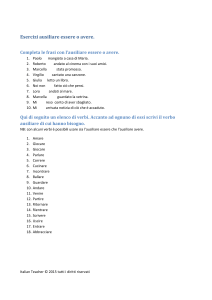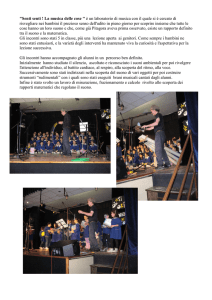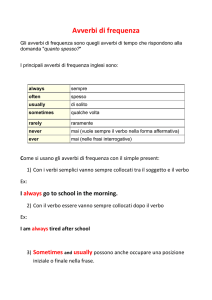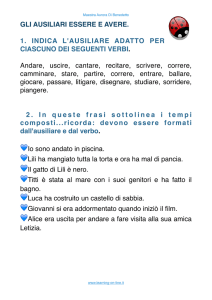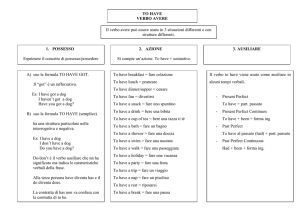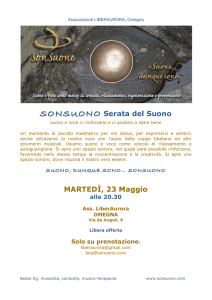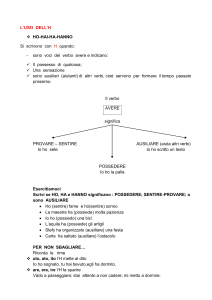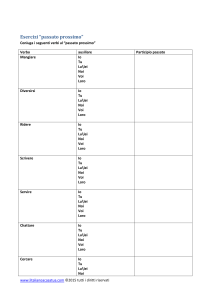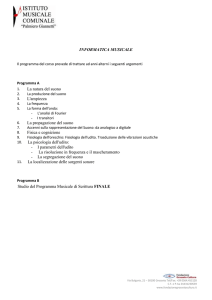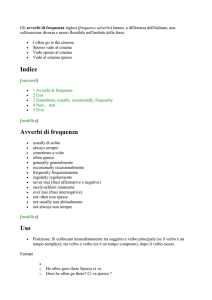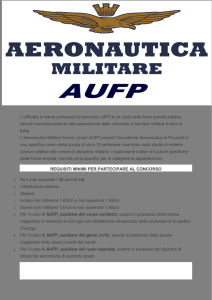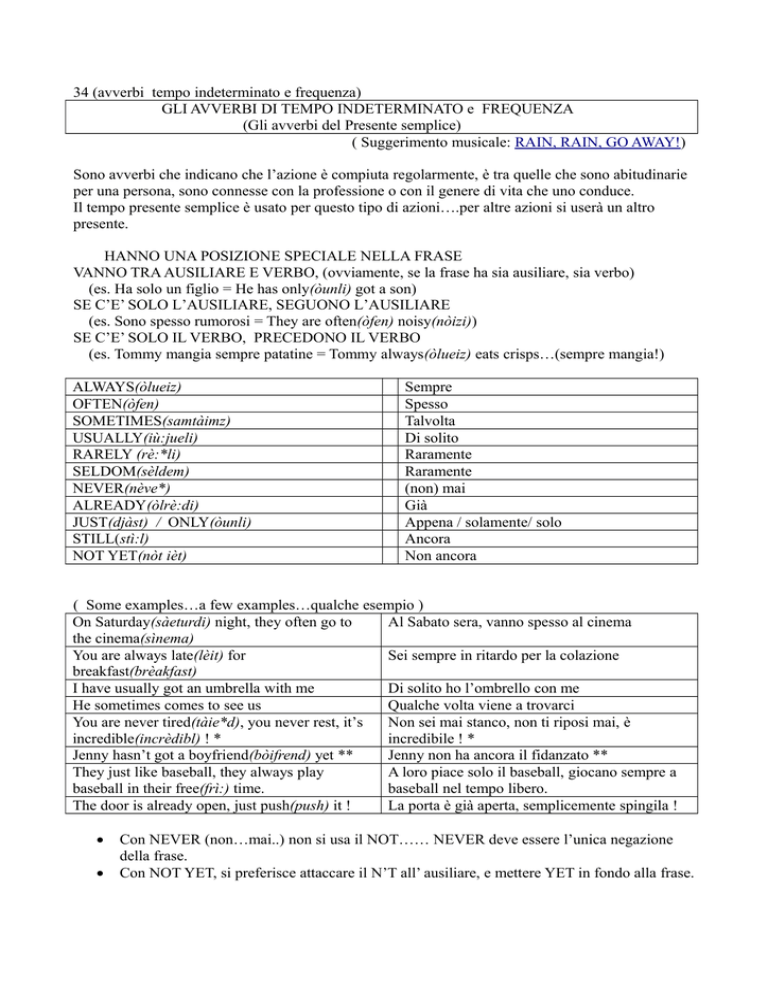
34 (avverbi tempo indeterminato e frequenza)
GLI AVVERBI DI TEMPO INDETERMINATO e FREQUENZA
(Gli avverbi del Presente semplice)
( Suggerimento musicale: RAIN, RAIN, GO AWAY!)
Sono avverbi che indicano che l’azione è compiuta regolarmente, è tra quelle che sono abitudinarie
per una persona, sono connesse con la professione o con il genere di vita che uno conduce.
Il tempo presente semplice è usato per questo tipo di azioni….per altre azioni si userà un altro
presente.
HANNO UNA POSIZIONE SPECIALE NELLA FRASE
VANNO TRA AUSILIARE E VERBO, (ovviamente, se la frase ha sia ausiliare, sia verbo)
(es. Ha solo un figlio = He has only(òunli) got a son)
SE C’E’ SOLO L’AUSILIARE, SEGUONO L’AUSILIARE
(es. Sono spesso rumorosi = They are often(òfen) noisy(nòizi))
SE C’E’ SOLO IL VERBO, PRECEDONO IL VERBO
(es. Tommy mangia sempre patatine = Tommy always(òlueiz) eats crisps…(sempre mangia!)
ALWAYS(òlueiz)
OFTEN(òfen)
SOMETIMES(samtàimz)
USUALLY(iù:jueli)
RARELY (rè:*li)
SELDOM(sèldem)
NEVER(nève*)
ALREADY(òlrè:di)
JUST(djàst) / ONLY(òunli)
STILL(stì:l)
NOT YET(nòt ièt)
Sempre
Spesso
Talvolta
Di solito
Raramente
Raramente
(non) mai
Già
Appena / solamente/ solo
Ancora
Non ancora
( Some examples…a few examples…qualche esempio )
On Saturday(sàeturdi) night, they often go to
Al Sabato sera, vanno spesso al cinema
the cinema(sìnema)
You are always late(lèit) for
Sei sempre in ritardo per la colazione
breakfast(brèakfast)
I have usually got an umbrella with me
Di solito ho l’ombrello con me
He sometimes comes to see us
Qualche volta viene a trovarci
You are never tired(tàie*d), you never rest, it’s
Non sei mai stanco, non ti riposi mai, è
incredible(incrèdibl) ! *
incredibile ! *
Jenny hasn’t got a boyfriend(bòifrend) yet **
Jenny non ha ancora il fidanzato **
They just like baseball, they always play
A loro piace solo il baseball, giocano sempre a
baseball in their free(frì:) time.
baseball nel tempo libero.
The door is already open, just push(push) it !
La porta è già aperta, semplicemente spingila !
Con NEVER (non…mai..) non si usa il NOT…… NEVER deve essere l’unica negazione
della frase.
Con NOT YET, si preferisce attaccare il N’T all’ ausiliare, e mettere YET in fondo alla frase.
IL SUONO CONSONANTICO (j)
e IL SUONO (sh)
L’avverbio USUALLY ci offre l’occasione di soffermarci su un suono non molto frequente in
Inglese o in Italiano, ma meritevole di attenzione, il suono (j)
E’ il suono caratteristico di molte parole Francesi, è il soggetto “io”(= Je) di “je suis”. In Italiano, lo
usiamo appunto per le parole che ci vengono dal Francese, come “garage”, a patto che sappiamo
pronunciarlo bene, e non lo pronunciamo come se fosse una “ge” Italiana!
Dal punto di vista della classificazione fonetica, il suono (j) è molto simile al (sh) di “sciopero”,
solo che (sh) è sordo, senza vibrazione delle corde vocali, mentre (j) è sonoro, e le corde vocali
vibrano.
Pronuncia (j)( sonoro)
Pronuncia (sh)(sordo)
USUALLY(iùjueli) = di solito
SHE(shì:) = lei
GARAGE(gàerà:j) = autorimessa
ENGLISH(ìnglish) = Inglese
TELEVISION(televìjen) = televisione
ATTENTION(etènshen) = attenzione
COLLISION(kelìjen) = collisione
COMMISSION(kemìshen) = commissione
EXPLOSION(eksplòujen) = esplosione
TO WISH(uìsh) = desiderare
AUBERGINE(oberjì:n) = melanzana
TO WASH(uòsh) = lavare/ lavarsi
Frasi per esercizio di COMPRENSIONE, e RETROVERSIONE
You always go by car, while(uàil) I use(iù:s) my Tu vai sempre in macchina, mentre io uso la
bicycle(bàisikl).
bicicletta.
When it is fine(fàin), go by bicycle, don’t use
Quando c’è bel tempo, vai in bici, non usare la
your car!
macchina !
John works in the City(sìti), in the same(sèim)
building(bìlding) as Mr. Fox.
He often meets(mì:ts) him, and they sometimes
eat together(tugèth^e*) at the self service(sèlf
sè:*vis).
This computer is old, and it has got a lot of
viruses(vàiresez).
It never works well.
I want to replace(riplèis) it with a new one!
Have you got any money ?
I want to buy(bài) some clothes(klò:uz)…
No, I am sorry(sòri), I have only got fifteen
pounds(pàundz) , at the moment!
Impariamo vocabolario, e pronuncia…!
Stesso…di = SAME…AS(sèim….àez)
Spiacente = SORRY(sòri)
Vestiti = CLOTHES(klò:uz)
Mentre = WHILE(uàil)
Usare = TO USE(tu iù:s)
Incontrare = TO MEET(tu mì:t)
John lavora nella City, nello stesso edificio di
Mr: Fox.
Lo incontra spesso, e qualche volta mangiano
insieme al self service.
Questo computer è vecchio, ed ha un mucchio di
virus.
Non funziona mai bene.
Voglio sostituirlo con uno nuovo !
Hai dei soldi ?
Voglio comprare dei vestiti…
No, mi spiace (sono spiacente), ho solo quindici
sterline, al momento !
Edificio = BUILDING(bìlding)
Sterlina = POUND(pàund)
Andare in macchina = TO GO BY CAR(tu gòu
bai kà:*)
Comperare = TO BUY(tu bài)
Soldi = MONEY(màni)
Insieme = TOGETHER(tugèth^e*)

